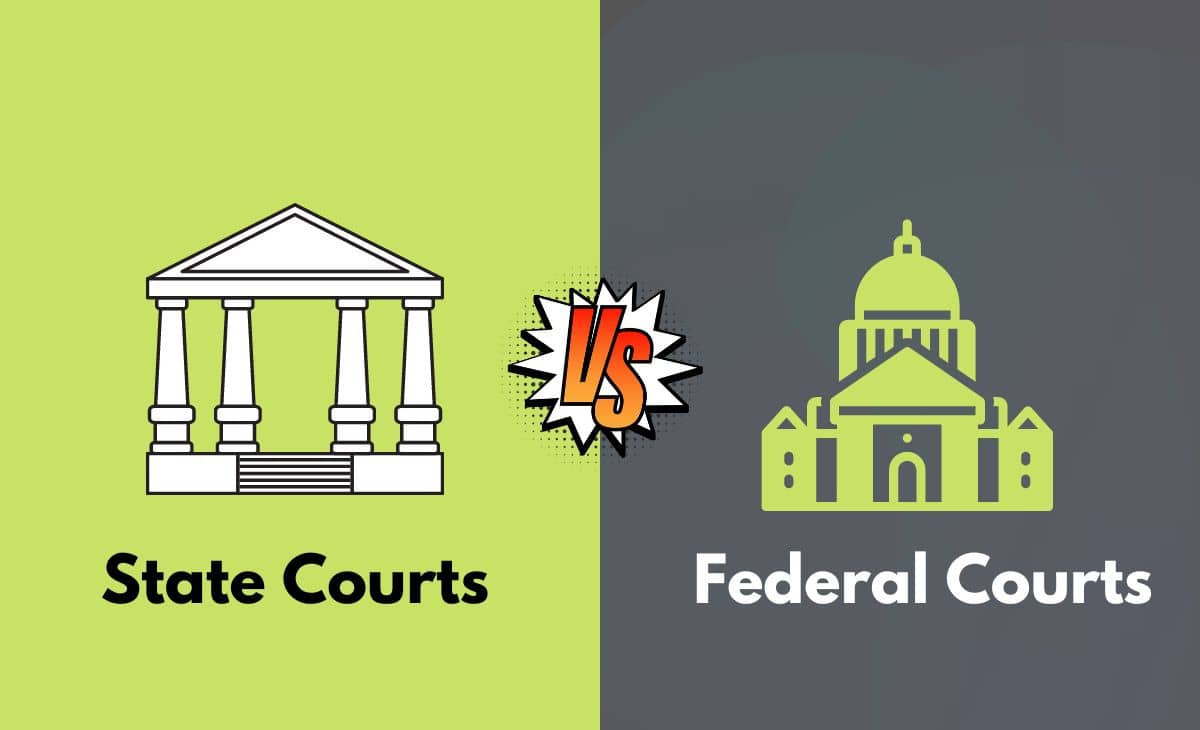Comparing Federal & State Courts
The U.S. Constitution establishes a federal system of government in which power is shared between the federal government and state governments. As a result, both the federal government and each state have their own court systems. There are important differences between these court systems in terms of structure, selection of judges, length of judicial terms, and types of cases handled. Understanding these key distinctions is essential to navigating the United States judiciary.
Structure
The structures of the federal and state court systems are defined differently under U.S. law.
Federal Court System
Article III of the Constitution creates the judicial branch of the federal government. It establishes one Supreme Court and gives Congress the authority to create lower federal courts. Using this power, Congress has established:
- 13 U.S. Courts of Appeals
- 94 U.S. District Courts
- U.S. Court of Federal Claims
- U.S. Court of International Trade
- U.S. Bankruptcy Courts
There are also federal Magistrate Judges and other specialty courts.
State Court Systems
The constitutions and laws of each state establish the state courts. Every state has a court of last resort, usually called the Supreme Court, and most have intermediate appellate courts below their court of last resort. States also have trial courts, often called District or Circuit Courts, as well as specialty courts like juvenile court and probate court.
Selection of Judges
Federal judges are selected differently than state court judges.
Federal Court System
Under Article II of the Constitution, the President nominates federal judges and the Senate provides advice and consent on the nominations. Judges who are confirmed hold office for life terms during good behavior. They can only be removed through Congressional impeachment proceedings for misbehavior.
State Court Systems
There are several methods used to select state court judges:
- Election by the state citizens
- Appointment by governors or legislatures for set terms
- Appointment for life terms
- Combinations of these selection methods
Terms of Office
The terms of office differ significantly between the federal and state judiciaries.
Federal Court System
Federal judges have lifetime tenure during good behavior under Article III of the Constitution. This gives them a high degree of independence from political pressure and incentives to rule justly.
State Court Systems
State court judicial terms vary widely, from appointments lasting a set number of years to lifetime tenure. Many states also elect judges to set terms via popular elections. State judges generally do not have the same lifetime tenure protections as federal judges.
Types of Cases Handled
In general, federal courts handle different types of cases than state courts.
Federal Court System
Federal courts deal with:
- Constitutional issues
- Federal laws and treaties
- Disputes between states
- Admiralty
- Bankruptcy
- Habeas corpus
They serve as the final arbiters on federal legal questions.
State Court Systems
State courts handle most:
- Criminal cases
- Contract disputes
- Tort cases
- Probate matters
- Family legal issues
They are the final authority on interpreting state constitutions and laws. Their rulings on federal law can be appealed to the Supreme Court.
Key Differences in Authority
While federal and state courts operate in parallel, there are some key differences:
Final Authority
- Federal courts have final authority over interpretation of the U.S. Constitution.
- State courts have final authority over interpretation of state constitutions and laws.
Shared Authority
The appeals process creates shared authority. State court rulings on federal law can be appealed to the Supreme Court.
Conclusion
The United States has dual court systems at the federal and state level that play complementary roles. The federal courts get their structure and authority directly from the U.S. Constitution. They handle issues arising under federal laws with judges who have lifetime appointments. The state courts are founded on state laws and constitutions. They handle most criminal and civil trial matters and elect or appoint judges to set terms of office. Understanding these key differences helps explain how judicial authority is allocated under America’s system of federalism.
And finally, here are 5 FAQs related to the comparison between federal and state court systems:
1. Which court system has final authority over the U.S. Constitution?
The federal courts have the final authority to interpret and apply the U.S. Constitution. The Supreme Court is the ultimate arbiter of federal constitutional questions.
2. Do federal courts ever hear cases that arise under state laws?
Federal courts generally do not hear cases that solely involve state laws. However, sometimes they may hear cases with state law issues if they also have federal legal questions or if there is diversity jurisdiction between citizens of different states.
3. What types of cases do state courts handle that federal courts do not? State courts handle most criminal, civil, contractual, tort, probate, and family law cases. Federal courts do not hear cases in those categories unless they have some federal legal issue.
4. How do judges get selected to the federal courts versus state courts? Federal judges are nominated by the President and confirmed by the Senate, while state judges are selected through methods like elections, legislative/gubernatorial appointments, or combinations thereof.
5. Can a state court interpretation of federal law be appealed to the U.S. Supreme Court? Yes, state court rulings regarding federal laws or the U.S. Constitution can be appealed to the Supreme Court, which then has discretion on whether to hear the appeal.







